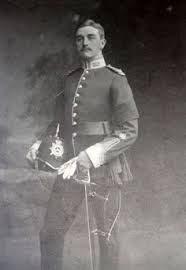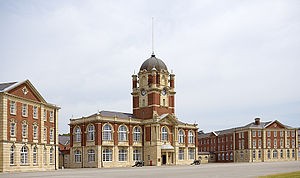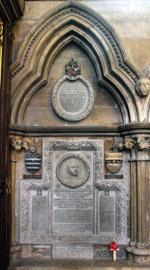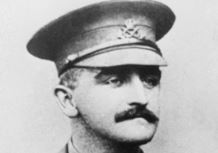Dewsbury Reporter, Wakefield and West Riding Herald –
A F G Kilby V.C.

A F G Kilby
On the front page of the above newspaper dated 19th of August 1916 are a selection of pictures of officers from various regiments who had either been reported missing or killed, including:- Lieut. P E Melly, King’s Liverpool Regt., who was officially reported missing; 2nd Lieut. E Archer, Wakefield Territorials, who was also reported missing. These men have a connection to Wakefield and the surrounding area, but one seems to have no connection whatsoever – Captain A F G Kilby, V.C., M.C., South Staffordshire Regt. Why was he included?
Anyway, until I find out otherwise here is a little about A F G Kilby. Arthur Forbes Gordon Kilby was born in Cheltenham in 1885, the only son of Sandford and Alice Kilby, nee Scott.
Before I go any further, I clicked on a link the other day and it took me to a BBC page about a soldier who was classed as ‘Cheltenham’s forgotten VC hero’. I saved the page thinking one day I will have a closer look at who he was. While I was in France – holiday and time out to research, I went through a pile of Wakefield Express cuttings in readiness to blog about. So today, I pick up the first cutting, start putting a few words down, then decide to Google Arthur. Well, blow me down, I came across the BBC page I mentioned earlier. What a coincidence! Or, more to the point how strange for me to chose Arthur out of all the articles I have.
Back to Arthur, his parents had married in India in 1878. Sandford being at one time in the Bengal Preventive Service. He had also been Assistant Collector of Customs in Chittagong, served in the Police department, worked on famine relief duty, 1873 and 1876. He also worked in Madras as Deputy Commander, abkari and salt departments and retired in 1892. He died in London in 1923 leaving over £11,000.
It seems that by looking into Arthur’s parents I think I have found why he is included in a Wakefield paper. Alice Flora Scott was born in Wakefield in 1857, while her husband seems, according to various sources, been born at sea. But with delving a little further I find that Sandford James Kilby was the son of George Henry Kilby (1820), George inturn was the son of John Kilby (1770) (who had been Lord Mayor of York), whose other son was Thomas Kilby, the Rev Thomas Kilby, whose parish was St John’s, Wakefield. Thomas was also a renown local artist and painted many scenes from the area. It seems that there was a connection to Wakefield afterall.

Sandhurst College via Wikipedia
Arthur was educated at Bilton Grange, a preparatory school near Rugby followed by Winchester College. He attended the Royal Military College, Sandhurst, graduating in 1905. He is found in Forbes List of 1908 as a 2nd Lieutenant commissioned into the South Staffordshire Regiment. FindmyPast have a document online that confirms his graduation in 1905, giving his height as 6ft ½” and his father’s address as Skelton Hose, Leamington. Promoted to a Captain in 1910, Arthur was fluent in Hungarian and German and could also speak French and Spanish fluently. At the outbreak of war, Arthur was posted with the BEF to France and Belgium with the 2nd Battalion, arriving about two weeks after war was declared. In February of 1915, he had been awarded the Military Cross and appears in the London Gazette for this award.
He was killed in action on 25th of September 1915 on the first day of the Battle of Loos, while leading his men on at on enemy positions near Cuinchy, on the Le Bassee Canal. During the first day of the battle over 40 other men from Cheltenham also lost their lives. It was what Arthur did during the attack that he was awarded a posthumous Victoria Cross . His citation in the London Gazette dated 30th March 1916 reads :
“For most conspicuous gallantry. Captain Kilby was specially selected, at his own request, and on account of the gallantry which he had previously displayed on many occasions, to attack with his Company a strong enemy redoubt.
“The Company charged along the narrow towpath, headed by Captain Kilby, who, though wounded at the outset, continued to lead his men right up to the enemy wire under a devastating machine gun fire and a shower of bombs.
“Here he was shot down, but, although his foot had been blown off, he continued to cheer his men and to use a rifle. Captain Kilby has been missing since the date of the performance of this great act of valour, and his death has now been presumed.”
Arthur has an entry in De Ruvigny’s Roll of Honour and his entry includes the following passages :
…being an interpreter in German, Hungarian, the only officer in the Army with the latter distinction, and could also speak French and Spanish fluently; transferred to the 2nd Battn. in 1910, which he joined in the winter of that year, and was put in charge of E Coy. In 1912 his tug-of-war team came out second in the Brigade Sports, and in the Regimental Sports at Lichfield in Sept. the men of his company entered most of the events, and won the shield, worth about 300 points.
When the European War broke out he was preparing for the Staff College; served with the Expeditionary Force in France and Flanders from 12 Aug 1914: took part in the retreat from Mons, the Battle of Aisne, and the First Battle of Ypres when he was severely wounded and invalided home. After six months in England, during the last two of which he was attached to the 8th Battn., he returned to the front in May, 1915, where he performed consistent good work during the months of Aug. and Sept. while the battalion was holding A 2 Section, making some very useful reconnaissances, imbuing ranks with keenness by his example, for which he was subsequently recommended for the D.S.O. and was killed in action near La Basse 25 Sept. 1915, while leading an attack on the strong Railway Triangle Redoubt. He was buried where he fell, with Lieut. Williams and 13 men of his company, a cross being erected by the enemy.
Brigadier-General A C Daly wrote ‘ Capt. A F G Kilby, on the night of Sept. 5 – 6, went out along the Canal Towpath under cover of darkness, accompanied by a Lieut. (Thompson) of the 1st King’s, and closely reconnoitred the German position on the Embankment Redoubt, and brought back most useful information. The Reconnaissance was a very dangerous one, as the canal bank is a hot-bed of snipers, and it required by the greatest skill and courage to get right up to the German position as Capt. Kilby did. This is only one specific instance. this officer constantly made night reconnaissances of this nature,’ and again: ‘I had only the honour of knowing him for four months, but I formed a deep admiration and affection for him, and always said he was the best Company Commander in the Brigade.’
……He was wounded at the very start, but still insisted on cheering his men right up to the German wire, which our guns had been unable to destroy. He was the best officer in the Regiment, beloved by his men and absolutely fearless…..The regiment received a message of congratulation on the gallantry of the attack under such conditions. Capt. Kilby was twice mentioned in Despatches………….
For his deeds during that day the German defenders erected a cross where he fell. His body was found in 1929 and interred at Arras Road Cemetery, Roclincourt.
The Register of Soldiers’ Effects tells that the War Office were to pay over £40 to Arthur’s beneficiary, which according to the Probate Calendars, was his father, Sandford James Kilby, gentleman with effects of £849 10s 5d.

Memorial to Capt. A F G Kilby, V.C. source unknown but acknowledged.
A memorial to Arthur was placed in St Nicholas’s Chapel, York Minster by his family. The memorial bears the inscription of his deeds and awards and contains the family coat-of-arms and a bust of Arthur. St Cuthbert’s Church, Peasholme Green, York also has him listed on their war memorial.
In 2012, Kilby’s Victoria Cross, along with another awarded to Private Sidney Godley, the very first VC recipient of World War I, was sold at a London auction for £276,000 each to Lord Ashcroft. Captain Kilby’s medal are now part of the Lord Ashcroft Medal Collection in the Imperial War Museum in London.
We know that Sandford died in 1923 and The Yorkshire Post and Leeds Intelligencer of 8th of March 1923 tells :
Bequest of a V.C. Decoration. Mr Sandford James Kilby, of Leamington, son of a former Lord Mayor of York, left £11,902, net personalty being £9,14. He gave the portrait of his late son, Captain Arthur Forbes Gordon Kilby, the tunic he wore when wounded at the Battle of Ypres, and his Victoria Cross and other decorations won by him to Mrs Kilby for life, and then for his daughter, Dorothy Alice Howlett, for her life, with remainder to her eldest son, who shall take the name Kilby. In the event of the failure of these trusts, these articles are to be offered to the National Portrait Gallery.

Arthur Forbes Gordon Kilby
I have found over the past years, especially the past two weeks, that by just find a simple headstone, with only a name and an occupation or by just being given a name and very little else, what wonderful stories are to be found. Arthur. started off as a photograph in a newspaper, a newspaper quite a distance from where he lived – it seems that quite an interesting story came to light and answered the question, why he was in the Dewsbury Reporter, Wakefield and West Riding Herald. Here is the photograph that appeared in the paper and started the afternoons mystery – quite a distinguished looking man, isn’t he?